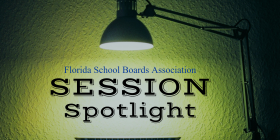Several Interim Legislative Committee meetings were held this week. Among the more significant meetings, the Senate PreK-12 Education Appropriations Subcommittee focused on K-12 Assessments Policy and Funding. A panel comprised of Commissioner Pam Stewart and five district superintendents — Kurt Browning (Pasco), Mike Grego (Pinellas), Walt Griffin (Seminole), Ken Kenworthy (Okeechobee), and Tom Russell (Volusia). DOE offered a State Assessment Program Overview (linked here and posted on the FSBA 2017 Legislative Session webpage) that was followed by a discussion of the current state assessment system and suggestions for improvement. The superintendents did an excellent job of articulating key concerns and outlining the following recommendations intended to restore instructional time, reduce disruptions, reduce the testing time, and remain compliant with federal ESSA requirements:
- Eliminate EOC assessments that are not required for graduation (Geometry, Algebra II, Civics, and U.S. History) and the 9th Grade FSA in English Language Arts (ELA).
- Allow statewide assessments to be administered by paper and pencil.
- Restore the authority of districts to design and administer personnel evaluations and eliminate the use of the Value Added Model (VAM).
- Authorize the use of a nationally recognized assessment — such as the ACT or SAT — in lieu of the 10th grade ELA assessment.
In response to these recommendations, Commissioner Stewart stated that the elimination of non-required state assessments would produce a savings of approximately $14 million. She also stated that paper and pencil test administration would require a longer turn-around time to get test results and estimated that it would add about $32 million to the cost of assessments. She suggested that it might be more efficient and ease disruption if districts were able to achieve a 1 to 1 ratio of students to devices, perhaps through leasing the equipment. With regard to using ACT or SAT in lieu of the ELA, Commissioner Stewart commented that the use of these assessments would delay the return of results since scores are typically returned in August. In addition, she felt it would be necessary to check ACT/SAT alignment with Florida standards.
In another key meeting, the House PreK-12 Appropriations Subcommittee will be engaging in budget exercises to consider scenarios for budget reductions of both recurring and non-recurring funds (the full House Appropriations Committee and Subcommittees are also engaged in similar exercises). The PreK-12 Appropriations Subcommittee will consider two reduction scenarios: the first exercise calls for a reduction totaling $232.7 million ($164.8 recurring, $68 in nonrecurring) and the second calls for a reduction totaling $485 million ($417 recurring, $68 nonrecur ring). The intent of these exercises is to identify funding priorities with an eye toward accommodating the anticipated state revenue shortfalls projected to occur after the 2017-2018 fiscal year. As background for these exercises, Subcommittee members were provided several documents including the current year (2016-2017) Base Budget. Generally, the current year Base Budget is the starting point for developing the state budget for the following year. It is comprised of the current year’s final budget minus all vetoed funding and non-recurring revenue allocations and is considered to be t he bare-bones “must fund” priorities. Subcommittee members have been challenged to review this base budget and consider whether each item is, in fact, a priority and/or whether more or less recurring or non-recurring funding should be allocated to each item. Because it contains a great deal of valuable information – including district-by-district base budget allocation speadsheets that you may wish to review and discuss with your legislators — the Base Budget is linked here and posted on the FSBA 2017 Legislative Session webpage. The Subcommittee will conduct the budget reduction exercise at their meeting scheduled for February 9th and is expected to report their recommendations to the full Appropriations Committee the following week.
[toggle title=”Other Meetings of Interest this Week“]
The House PreK-12 Innovation Subcommittee had presentations on the Impact of School Choice and Florida School Choice Programs. The meeting packet is available HERE.
The House PreK-12 Quality Subcommittee had a presentation on effective teachers and a panel discussion on recruiting and retaining effective teachers for turnaround schools. The meeting packet is available HERE.
The House Public Integrity & Ethics Committee had preliminary discussions of DRAFT Proposed Committee Bills (PCBs) relating to state and local government ethics reform. This week’s meeting packet is available HERE.
[/toggle]
The next round of Interim Legislative Committee meetings will be held during the week of January 23-26, 2017. We will give you a preview of that week’s meetings on Monday, January 23. Also, please note that we have updated the FSBA Bill Tracking List with those education related bills filed through January 13. The updated list is also posted the FSBA 2017 Legislative Session webpage.



